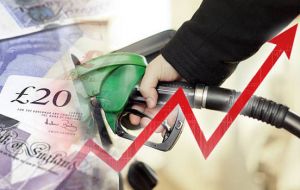MercoPress. South Atlantic News Agency
UK inflation remained unchanged in June at 2.4%
 “Petrol prices rose by 2.7% per liter between May/June 2018 to stand at 128 pence per liter in June, the highest average price since September 2014,” the ONS said
“Petrol prices rose by 2.7% per liter between May/June 2018 to stand at 128 pence per liter in June, the highest average price since September 2014,” the ONS said The cost of fuel rose to its highest level in almost four years last month and held up the rate of inflation in the UK, according to the Office for National Statistics.
Britain's headline rate of consumer price inflation (CPI) was 2.4% in the month of June, unchanged from the previous month. CPIH, the ONS' favored measure of inflation was also unchanged, steady at 2.3%.
That was almost entirely down to the rising price of petrol, which has been triggered by steadily rising oil prices. Oil is now at around US$ 71 per barrel, a level not seen since around four years ago.
“Petrol prices rose by 2.7% per liter between May and June 2018 to stand at 128.0 pence per litre in June, the highest average price since September 2014,” the ONS said in its release.
Without the increased price of fuel, the UK's headline rate of inflation would likely have dropped last month, the ONS said, continuing a steady decline witnessed throughout 2018.
“Consumers have been feeling the benefit of the summer clothing sales, and computer game prices have also fallen,” Mike Hardie, the ONS' head of inflation said in a statement.
“However, gas and electricity and petrol prices all rose, with consumers seeing the highest price at the pump for nearly four years, with inflation remaining steady overall,” he added.
Inflation in the UK had been subdued for several years prior to the vote to leave the EU in June 2016. But the vote caused a fall in the value of the pound which pushed up inflation. As the pound has recovered, inflation has started to fall, dropping from 3% in January to its current level.
The latest inflation figures come just 24 hours after the ONS showed UK employment hitting its highest level ever and wages continuing to rise steadily. Average UK earnings increasing by 2.7% in the three months up to May, meaning that wages are still growing above inflation. It means the average Brit is a little better off each month.
The pound fell sharply on the news as the steady inflation. This is because it makes it slightly less likely that the Bank of England will decide to raise interest rates at its next Monetary Policy Committee meeting on August 2.




Top Comments
Disclaimer & comment rulesCommenting for this story is now closed.
If you have a Facebook account, become a fan and comment on our Facebook Page!